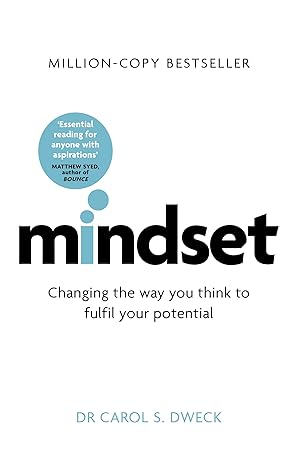“MINDSET: How You Can Fulfill Your Potential” by Carol Dweck explores the profound impact that our mindset has on our success and personal growth. Dweck introduces the concept of the “fixed” and “growth” mindsets, explaining how the belief in the ability to improve through effort can transform how we approach challenges, learning, and relationships. This book offers valuable insights into how adopting a growth mindset can lead to a more fulfilling life, encouraging readers to embrace challenges, learn from failures, and continuously strive for personal development.

“MINDSET: How You Can Fulfill Your Potential” by Carol Dweck is a transformative book that explores the concept of “mindset” and its impact on every aspect of our lives. Here are 25 key lessons from the book:
1. Fixed vs. Growth Mindset
– People with a fixed mindset believe their abilities are static, while those with a growth mindset believe abilities can be developed through effort and learning.
2. The Power of “Yet”
– Adding “yet” to a statement like “I can’t do this” transforms it into a growth mindset phrase: “I can’t do this yet.”
3. Embrace Challenges
– People with a growth mindset see challenges as opportunities to learn and grow, not as threats to their self-esteem.
4. Learn from Criticism
– Constructive criticism is viewed as helpful feedback rather than a personal attack in a growth mindset.
5. The Role of Effort
– Effort is seen as the path to mastery rather than a sign of lack of ability.
6. Value of Persistence
– Persistence in the face of setbacks is a hallmark of the growth mindset.
7. Change is Possible
– Even those with a fixed mindset can develop a growth mindset through awareness and practice.
8. Failure as a Learning Opportunity
– Failure is an important part of the learning process and should be seen as a stepping stone, not an endpoint.
9. Success of Others
– Growth-minded individuals find inspiration in the success of others instead of feeling threatened or jealous.
10. The Importance of Belief
– Believing in the ability to grow is essential to actually growing. Your mindset shapes your reality.
11. Focus on the Process
– Focus on learning and improvement, not just the outcome. The process is where growth happens.
12. Redefining Success
– Success is not about winning or being the best; it’s about learning, growing, and improving.
13. Mindset in Relationships
– A growth mindset in relationships leads to better communication, problem-solving, and mutual respect.
14. Mindset in Parenting
– Encouraging a growth mindset in children helps them become resilient, motivated, and successful adults.
15. Mindset in Business
– Companies that foster a growth mindset encourage innovation, collaboration, and long-term success.
16. Learning from Setbacks
– Setbacks should be analyzed for lessons rather than taken as proof of inadequacy.
17. Mindset in Sports
– Athletes with a growth mindset see practice and effort as key to improving their performance.
18. Developing Resilience
– Resilience is built by facing and overcoming obstacles, which is easier with a growth mindset.
19. Language Matters
– The words we use can reinforce either a fixed or growth mindset. Phrases like “I can’t” can be reframed to “How can I?”
20. Encouraging Effort
– Praising effort rather than innate talent fosters a growth mindset in oneself and others.
21. Overcoming the Fear of Failure
– A growth mindset helps diminish the fear of failure, allowing people to take risks and try new things.
22. Mindset and Intelligence
– Intelligence is not fixed; it can be developed through hard work, good strategies, and input from others.
23. Changing Your Mindset
– Mindset is not set in stone. By recognizing and challenging a fixed mindset, you can develop a growth mindset.
24. Cultivating Curiosity
– A growth mindset encourages curiosity, leading to continuous learning and adaptation.
25. Mindset and Leadership
– Effective leaders foster a growth mindset in their teams, creating environments where everyone is encouraged to learn, grow, and contribute.
These lessons highlight the transformative potential of adopting a growth mindset, not just for personal development but for improving relationships, achieving success, and leading a fulfilling life.

